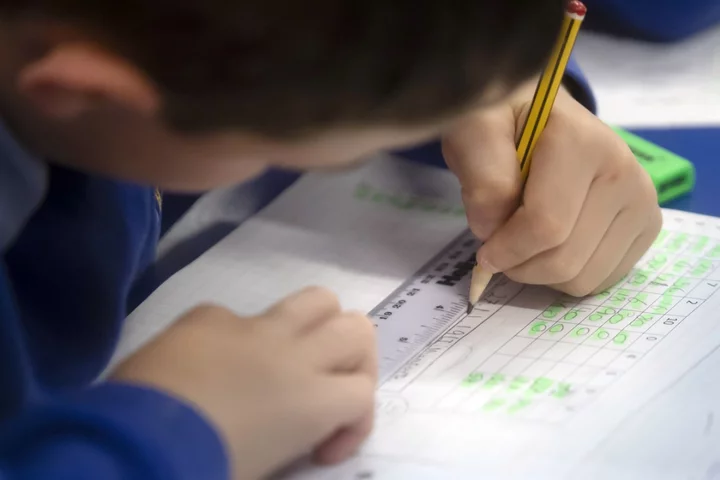
Children’s attention span is ‘shorter than ever’ in the classroom, teachers say
More than four in five primary school teachers believe the attention span of children is shorter than it was pre-pandemic, a survey has found. More than two in three (70%) primary school teachers say that children’s classroom behaviour has worsened post-Covid, according to a poll commissioned by online subject resource Kapow Primary. The survey, of 504 primary and early years teachers in schools in England, found 84% agree that primary children’s attention span is “shorter than ever” post-Covid, while 69% say that they have seen an increase in inattention and daydreaming since their young pupils returned to school after the pandemic. One in five teachers report that they spend less than 10 minutes on average on any single activity to maintain their children’s attention, the survey found. The majority of teachers say pupils are more likely to move around the room post-Covid (57%), are quicker to complain about being bored (57%), and are more likely to annoy and provoke others in the classroom (55%). Some have lost the ability to sit as part of a large audience and focus on a message being shared with the whole school A teacher working at an East London primary school More than four in five (85%) teachers agree that the “ever-swiping nature of social media” has negatively affected pupils’ attention span. One Year 5 and 6 teacher working at a Derbyshire primary school, who asked not to be named, said: “Behaviour in class is very different post-Covid. We had to teach the children through a screen during the pandemic, but taking the screen away now has had a massive impact. “Daydreaming is a big issue for us, as is helping children re-learn some of their social skills. Little things like turn-taking got lost during Covid. We also have to do a lot more movement breaks to avoid the children from tuning out.” Another teacher, working at an east London primary school, said: “The conduct of many children in assemblies has been particularly symptomatic. Some have lost the ability to sit as part of a large audience and focus on a message being shared with the whole school.” The government must also do much more to understand the problems around behaviour and provide more investment and support to schools and families Tiffnie Harris, Association of School and College Leaders Vicky Cottrill-Gray, education content director at Kapow Primary, said: “Children lost so much in-school time during the pandemic. When they went back, they brought new behavioural challenges with them that teachers are still having to deal with.” Tiffnie Harris, primary and data specialist at the Association of School and College Leaders (ASCL), said: “The findings of this survey chime with what we are hearing from school leaders. “It appears that behaviour has become more challenging among some pupils and that this is caused by a number of factors. There seems to be a long-term impact of the disruption of the pandemic to normal routines and expectations. “On top of this is the rising incidence of mental health and wellbeing problems among children which is exacerbated by the impact of the cost-of-living crisis on families and the pressures created by social media.” She added: “The Government must also do much more to understand the problems around behaviour and provide more investment and support to schools and families.” A Department for Education spokesperson said: “Our approach to tackling behaviour in schools has been to support schools to develop a behaviour culture that works for them, their pupils, and their communities. “We have updated our Behaviour in Schools guidance to provide clear advice on how to create and maintain high standards and our £10 million Behaviour Hubs programme is supporting up to 700 schools to improve behaviour.” The survey of primary school and early years teachers was carried out between April and May this year by Gerard Kelly & Partners.
1970-01-01 08:00
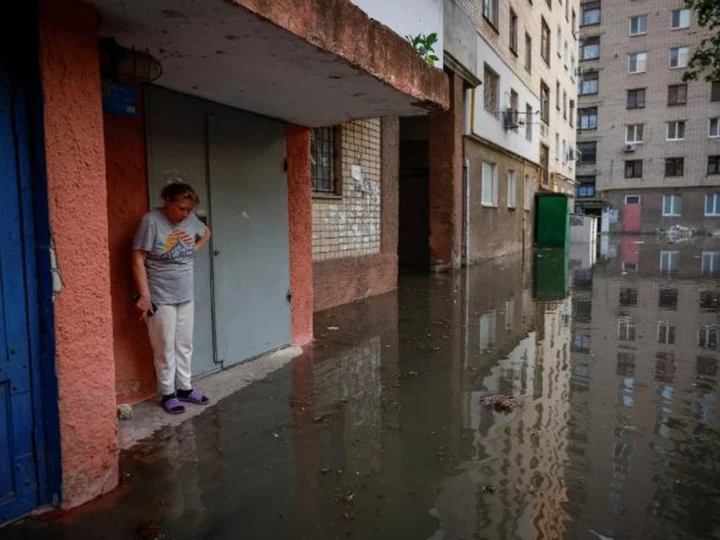
Collapse of Ukraine's Nova Kakhovka dam an 'ecological catastrophe'
The collapse of the Nova Kakhovka dam in southern Ukraine has sparked fears of an ecological catastrophe, with Ukrainian President Volodymyr Zelensky describing the situation as "an environmental bomb of mass destruction."
1970-01-01 08:00

Joe Wicks makes workout video for people with Parkinson’s
Fitness coach Joe Wicks has teamed up with the NHS to create a dedicated workout video for people with Parkinson’s disease. Parkinson’s symptoms can cause involuntary shaking of parts of the body, slow movement and stiff or inflexible muscles. However, regular exercise has been shown to have a positive impact on such symptoms. Wicks has worked with experts at St Thomas’ Hospital in London to help people with the condition exercise at home. The specialised workout video compromises of 10 different exercises put together by Wicks, known as The Body Coach, who was hailed for hosting daily PE lessons online during lockdown. “I’m so passionate about making exercise accessible for all people, no matter their ability,” Wicks said. “Taking part in regular exercise has many benefits not just for your physical health, but also your mental health. “It was great to come down to St Thomas’ Hospital to hear more about how exercise can help people with Parkinson’s manage their symptoms and to create this workout video tailored specifically for them.” Milly Khan, a highly specialist neuro-physiotherapist at Guy’s and St Thomas’ NSH Foundation Trust, said: “Physical activity is a really important component of treatment for Parkinson’s and the condition shouldn’t be a barrier to being physically active. “Having this specially created resource that people can do in the comfort of their own home will make a huge difference to not only the patients I see at St Thomas’, but those across the country.” – The exercise video for people with Parkinson’s is available free online on The Body Coach YouTube channel.
1970-01-01 08:00
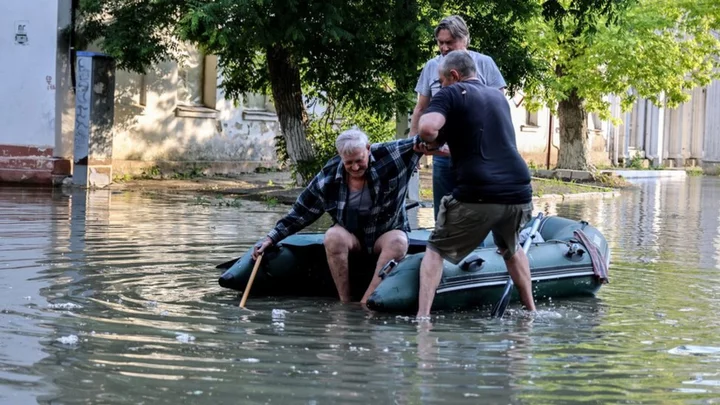
Ukraine dam: UN warns of 'grave consequences' as thousands flee homes
The UN's aid chief warns of "grave consequences" as floodwater levels may continue to rise.
1970-01-01 08:00

Woman claims boyfriend period-shamed her for disposing menstrual pads in his trash
A woman has enlisted help from the internet after sharing that her boyfriend shamed her for disposing of her menstrual pads in his bathroom while she was on her period. This week, Reddit user u/ThrowAway568931 went viral when she asked in the popular forum r/AmITheA**hole if she was in the wrong for throwing away her used pads in her boyfriend’s trash can. As she explained how her boyfriend called her “disgusting” for disposing of her menstrual pads at his house, many people have since called attention to what’s known as “period shaming”. The 18-year-old girl revealed in the viral post that she’s been dating her 23-year-old boyfriend for about three months, and that this was the first time she spent the night over at his place while she was on her period. “Since yesterday, I’ve been changing my pads in his bathroom and each time, I wrapped the used pad in a plastic wrapper and put it in the trash can,” she wrote. “The trash can has a lid and there’s a plastic garbage bag in there, so the pad was touching nothing but the trash that was already inside.” “I genuinely didn’t think it was a big deal, until my boyfriend took out the trash this morning and noticed the plastic wrappers in the bag,” she continued. “He knew they were the packaging for my pads because he had seen them before and quite outraged, he asked whether my used pads were also in that bag.” When she informed him that she had disposed of her pads in his trash, she claimed that he called her “disgusting” and told her to “take out the trash myself.” He then told his girlfriend that she should’ve “just kept” the pads in her purse until she got home, despite the fact that she was sleeping over at his apartment for the next three days. “He stated that he didn’t want my blood all over his trash and that I should find another way to dispose of my pads ASAP,” she said, adding: “I don’t think my attempt of an explanation why period blood isn’t as disgusting as he thinks it is got through to him and he’s quite set on his opinion.” The Reddit user believed her boyfriend “was a bit childish” because she didn’t “understand how an adult straight man can be so disgusted by period blood,” but when she texted her 19-year-old brother, he agreed with her boyfriend. “As I’ve been outnumbered, I wanted to see whether other people also believe what I did was an AH [a**hole] move.” Unsurprisingly, her post was immediately flooded by thousands of Reddit users encouraging her to break up with her “immature” boyfriend. “Please put him in the trash. Get yourself an adult boyfriend,” read one comment. “Women’s bodies are not gross. Imagine him having daughters with him behaving like this.” “He is too immature to date, he’s not ready for a relationship with a woman,” another person wrote. “He’s not the one, not for you and not for anyone until he learns to be more accepting of bodies.” Others pointed out that menstrual cycles are not something to be ashamed about, like one person who said: “I can’t imagine going through cramps, the hassle of leaks, and the overall discomfort of a period and on top of that having someone shame you for it.” “You deserve to be with a man that understands that menstrual cycles are part of life and not something to be grossed out about,” they added. While menstruation is a natural part of life, there has been much shame and stigma around “that time of the month.” In 2018, a poll found that nearly half of women in the United States have experienced “period shaming” – being made to feel a sense of embarrassment simply because they were on their period. The research – which was commissioned by feminine hygiene company THINX – even found that 42 per cent of women have experienced period-shaming, with one in five being made to have these feelings because of comments made by a male friend. Meanwhile, 12 per cent of women have been shamed by a family member and one in 10 by a classmate. Additionally, 44 per cent of men admitted to having made a joke about or comment on their partner’s mood when she was on her period. More than half of the men involved in the study also believed that it is inappropriate for women to openly mention their menstrual cycles in the workplace, which is likely why 73 per cent of women surveyed said they’ve hid a pad or tampon from view on their way to the bathroom. After her post went viral on Reddit, she revealed in a follow-up post that she didn’t break up with her boyfriend just yet, but she has cut her three-day visit short. “I’ll be honest, I did post this hoping someone would back me up on this, but I didn’t expect to have hundreds of people telling me to break up with my boyfriend,” said u/ThrowAway568931. “I think you’ll be pleased to hear that I’ve cut my visit short and gone home for the time being,” she explained. “No break-up I could talk about yet, but I’ve taken the comments to heart and if I don’t get some kind of explanation/apology in the near future, I’ll have to reconsider whether maintaining this relationship is actually worth it.” Read More Triathlete proudly shares ‘beautiful’ racing photo where she bled through swimsuit while on her period Bullies criticised a photo of my period stain during a triathlon. I responded by reposting it Menopause and menstruation guidance launched for workplaces to support employees DJ Michael Bibi diagnosed with rare brain and spinal cancer My child is vaping – how bad is it? ‘Covid killed my taste buds – then my business’
1970-01-01 08:00

DJ Michael Bibi diagnosed with rare brain and spinal cancer
DJ Michael Bibi has revealed that he has been diagnosed with a rare form of brain and spinal cancer that is “moving fast”. The 32-year-old producer opened up about the diagnosis in a new Instagram post, more than two weeks since he last posted about discovering he had a “neurological problem” after a check-up for his tinnitus. Bibi, one of the most popular DJs in the UK’s dance music scene, told fans he has been diagnosed with primary central nervous system (CNS) lymphoma. He posted a selfie showing a peace sign with a cannula in his hand on Monday night (5 June) and wrote: “Writing this post is a hard one. Last week I was diagnosed with CNS lymphoma. A very rare cancer that affects the brain and spine. “Unfortunately it’s moving fast and I have to stay in hospital starting treatment immediately. Typing this message doesn’t quite seem real and I’m sorry for the bad news. “I don’t know what lies ahead,” he continued. “I’m tired but I know I am strong and I won’t let this beat me. I will be back stronger for you all. Love Bibi.” Bibi was set to play at Manchester’s Parklife festival and Glastonbury this summer. It is unclear if he will be able to perform. Fellow DJs and others in the music industry sent him well wishes, including Steve Aoki, Paris Hilton, Tiesto and the electronic duo, Disclosure. Hilton wrote: “Sending you lots of love and light. Love you.” Aoki added: “Positive energy and healing to you legend. You’ll get through this.” His record label Solid Grooves also posted on Instagram in support of the founder, including a series of photographs of Bibi performing various DJ sets. It said: “The entire Solid Grooves team sends our love and support while he recovers, and we hope to have him back with us as soon as possible to make more memories.” According to Cancer Research UK, only two in every 100 brain or spinal cord tumours are lymphomas. Symptoms can include headaches, blurred vision, personality changes, seizures, and difficulty walking and balancing. Lymphoma means the cancer began in the lymphatic system, which is a system of thin tubes and lymph nodes that run throughout the body. Most lymphomas of the brain start in the front section of the brain but can also start in the spinal cord, eyes and layers of tissue that surround the organ. Read More Fitness fanatic, 26, diagnosed with stage 4 cancer after feeling dizzy Husband of non-smoker, 24, who died two weeks after lung cancer diagnosis reveals single telltale sign Sarah Beeny: Why I’m no longer scared of cancer My child is vaping – how bad is it? ‘Covid killed my taste buds – then my business’ Gemma Collins blasted for promoting headset as ‘magic’ cure for depression
1970-01-01 08:00
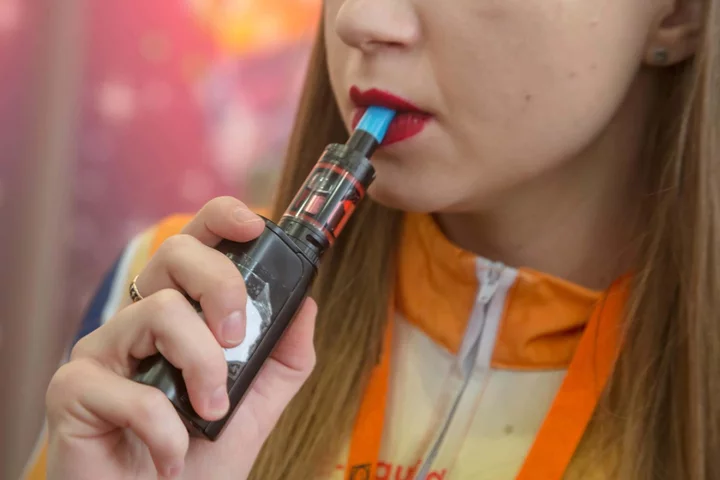
My child is vaping – how bad is it?
Paediatricians have warned vaping is “fast becoming an epidemic among children” and are calling for disposable vapes to be banned. Many parents may be concerned about their own child’s health if they’re vaping. In May, Action on Smoking and Health (ASH ) warned there had been a 50% rise in the proportion of children vaping – from 7.7% of 11 to 17-year-olds trying e-cigarettes last year to 11.6% this year. And because vapes haven’t been around long (they’ve only been on sale in the UK since 2007) there haven’t been any long-term studies on the effect on health, and particularly on young lungs, hearts and brains. However, responding to a current Government consultation on e-cigarettes, the Royal College of Paediatrics and Child Health (RCPCH) has warned e-cigarettes “are not a risk-free product and can be just as addictive, if not more so than traditional cigarettes”. The RCPCH’s vice president for policy and paediatric respiratory consultant, Dr Mike McKean, says: “Without a doubt, disposable e-cigarettes should be banned. Youth vaping is fast becoming an epidemic among children, and I fear that if action is not taken, we will find ourselves sleepwalking into a crisis.” But it’s a crisis many parents are ill-informed about – so here’s what the experts think parents should know… What are vapes?Hazel Cheeseman, deputy chief executive at ASH, describes vapes – also known as electronic cigarettes – as “a battery-powered heating element which heats a liquid – generally containing nicotine and other ingredients – that’s then inhaled as a vapour by users”. Some vapes are single -use and come in bright packaging, with exotic flavours and enticing, sweetie-type names like strawberry ice cream, cotton candy and cherry cola, others are rechargeable. Can children buy vapes? It’s illegal to sell vapes to under 18s in the UK. However, youngsters are clearly still getting their hands on them. McKean, who practises in the north-east of England, says he’s concerned to hear there’s been an increase in unregulated e-cigarettes hitting the UK market recently. He points out that in the north-east alone, more than 1.4 tonnes of illegal e-cigarettes – which Trading Standards said were often indistinguishable from regulated products – were seized from shops in the second half of last year. “It’s impossible to know what these products contain or how they might impact young people’s health,” he says. “The thought that these products are ending up in the hands of children is terrifying.” What do they contain? The crucial thing for parents to know is that they contain nicotine, which is harmful and addictive. Gurch Randhawa, professor of diversity in public health and director of the Institute for Health Research at the University of Bedfordshire, says: “E-cigarettes do not burn tobacco and do not produce tar or carbon monoxide, the most harmful aspects of smoking cigarettes. E-cigarettes typically contain nicotine, propylene glycol, vegetable glycerine, and flavourings.” Are they addictive? Yes. McKean warns: “Vaping is far from risk-free, and in many cases can be very addictive.” Cheeseman adds: “It appears likely that people who have not smoked can become addicted to nicotine through vaping”. What are the health impacts long-term? Randhawa says that because vapes are a relatively new product, evidence on their health impacts isn’t clear. Experts are concerned though – especially because people under the age of 18 are still developing. Nicotine is known to cause an increase in blood pressure, heart rate, flow of blood to the heart and a narrowing of the arteries.Cheeseman says: “We don’t know what the health implications will be long-term. It seems likely there will be some, but until we have a population of people who have exclusively vaped without smoking for many decades it will be difficult to fully assess the impact.” Decades ago, no one knew about the devastating health impacts of smoking either. How can parents help children quit? Ensure your child has all the correct information and risks associated with vaping. Rather than setting strict punishments, try to be understanding and have a gentle discussion about peer pressure and having the confidence to say no. Cheeseman says nicotine replacement therapy can be used for children as young as 12. Randhawa points out that e-cigarettes should only be used to help people stop smoking. “If you haven’t smoked, you should not use e-cigarettes, as they contain nicotine, which is addictive. This message needs to be understood and articulated across society and schools to support children to not take up vaping.” Read More Charity boss speaks out over ‘traumatic’ encounter with royal aide Ukraine war’s heaviest fight rages in east - follow live Leah Williamson’s first fiction book inspired by women’s football ban protest Love Island 2023: Is having a ‘type’ holding back your dating life? 8 home repair jobs to tackle quickly – before they cost you a fortune
1970-01-01 08:00

3 Denver Broncos who have to take the next step this season
After an underwhelming season, the Denver Broncos will look to flip the script in 2023. Here are three players who have to take the next step.The Denver Broncos seemed primed to be title contenders last season. They boasted one of the best defenses in the NFL. They had a wealth of offensive weap...
1970-01-01 08:00

Towns submerged, villages evacuated as dam breach floods southern Ukraine
By Viktoriia Lakezina KHERSON, Ukraine Hundreds of people were evacuated from settlements along the southern stretch of Ukraine's
1970-01-01 08:00
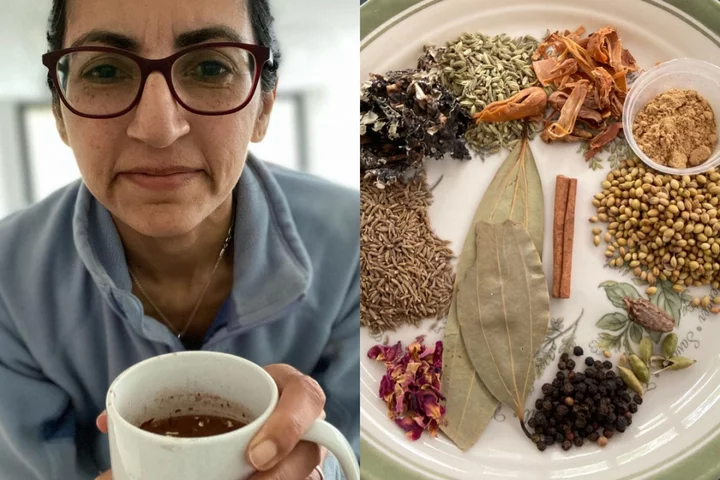
‘Covid killed my taste buds – then my business’
A cooking teacher who lost her sense of taste and smell and “never fully recovered” after catching Covid last summer has decided to shut her business because she can no longer gauge the quantity needed or quality of ingredients in her dishes. Raisa Ali, 51, said to continue teaching people how to cook Indian food would be like “the blind leading the blind” as her sense of taste and smell have never been the same since she caught Covid in July 2022. The mother-of-three, who lives in Kingston, south London, knew “something was missing” after her husband Akbar, 52, and her students found she was being heavy-handed with the spices but could not tell the difference. Raisa made the difficult decision to close her Sweet Sultry Spice cooking school after teaching a class how to make the Indian spice mix garam masala and realising that, while she knew the recipe from memory, she could not smell the pungent ingredients. Covid has “killed the joy of cooking” and dried up her source of income, but Raisa has now accepted what happened and is looking for a fresh start. Raisa, who has three sons, twins Zain and Zakir, 16, and Yusuf, 19, said: “I can’t dwell on this anymore and just have to move forward. “My main mode of cooking and learning and teaching has been to follow my nose. “I used to make my students take whiffs of everything at every stage. “I decided to close the school because when I lost my sense of taste and smell, my passion died. “Covid killed the most important part of food for me.” Raisa started giving cooking classes in her kitchen after completing a nutrition course in 2018 and taking advice from a friend. “I did a one-year nutrition course and started working online, trying to build a small business, but it wasn’t going anywhere and I was feeling very isolated,” she said. “A friend of mine came over and said ‘you’re doing it all wrong, why don’t you just open a cooking school’. “I was scared but she was like ‘feel the fear and just do it anyway.” She soon found herself giving two or three classes per week to groups of around five people for between £60 and £70, teaching them to cook Indian cuisine. “People would come over to my house and they wouldn’t leave – it was great,” said Raisa who moved to the UK in 2008 after her husband was transferred to the country for work. “It was a really great experience and then when it went away, I just thought now what am I going to do?” Just when her budding business started taking off, bringing in between £500 and £800 per month, Covid struck. “Suddenly Covid’s happening and from one day to the next the business totally died,” she said. “The income that I had was gone and everything that I had built was gone. “I spent that first year (2020) feeling sorry for myself.” Then while travelling back to her native California, in July 2022, Raisa caught Covid and spent two weeks in bed. “I spent the first two weeks in bed and then started to recover slowly,” she said. “When I came back, I had brain fog, I couldn’t smell things properly and I couldn’t taste things properly.” She noticed her taste buds were not firing on all cylinders after eating some tortilla chips which tasted like “cardboard”. “I’m eating them and thinking, I don’t understand, what is this?” she said. “And it has just never come back properly.” While Raisa started to recover after spending two weeks in bed, some of her symptoms lingered for months. Once lockdown rules lifted, Raisa went back to giving cooking classes, but it was not the same. In January 2023, while teaching a group how to make garam masala from scratch, Raisa’s sense of smell was put to the test. “When they could smell it across the room then I knew, at that point, that this wasn’t going to work for me because it would be like the blind leading the blind,” she said. “I remember telling my customers, look I’m telling you everything from memory and my past experience because I don’t have have my sense of taste and smell. “Isn’t that depressing?” On another occasion, she was cooking a chicken dish and a student asked about the ingredients but Raisa could not “taste anything”. “It turned out it was black pepper but I couldn’t even taste it,” she said. Her husband and children also started picking up on strong flavours which appeared relatively mild to her. “I knew something was missing because when I cooked things for my husband he would say ‘oh, you put a lot of this in’,” Raisa said. “But I could not tell the difference.” Even to this day, Raisa says she has not fully recovered her sense of taste and smell. “If I would sum it up, Covid killed the joy,” she said. “I just feel like I don’t want to bother anymore because I feel like my drive is gone. “So I decided, either I can be upset about it or I can reinvent myself again.” Raisa has decided to see her Covid nightmare as a positive step towards new beginnings. “If you are cooking something, you have to be able to smell and taste the ingredients and I knew I couldn’t do that so I decided it was time for a complete shift,” she said. She has not been to see a doctor about her long-lasting symptoms as she believes there are many other people who are “far worse off” and that the NHS already has “too much on its plate”. She is now looking to explore other business opportunities which do not rely on having a sense of taste and smell. “Sustainable living” is one area in which Raisa is particularly interested, but what this will look like in practice remains to be seen. “I want to get rid of my carbon footprint,” she said. “I don’t need to prove anything to anyone, it’s just what I want to do.” For more information about next steps, follow Raisa on Instagram. Read More Covid Inquiry could see unredacted Johnson WhatsApp messages despite legal clash I decide what’s relevant, says Covid inquiry chair in Boris WhatsApp row Covid Inquiry head making ‘no comment’ on legal row over Johnson messages Charity boss speaks out over ‘traumatic’ encounter with royal aide Ukraine war’s heaviest fight rages in east - follow live
1970-01-01 08:00

USMNT rumors: Adams to Forest, Marsch to Celtic, Gutierrez to United
Today's USMNT rumors include Tyler Adams being linked with Nottingham Forest, Jesse Marsch in contention for the Celtic job and Brian Gutierrez on Manchester United's radar.USMNT rumors: Tyler Adams to Nottingham ForestTyler Adams needs to get out of Leeds United who will be playing in...
1970-01-01 08:00

Canal that supplies Crimea getting far less water after Ukraine dam blast, warns Kremlin
By Andrew Osborn (Reuters) -A gaping hole punched in Ukraine's Nova Kakhovka Dam that unleashed a wall of floodwater means
1970-01-01 08:00
